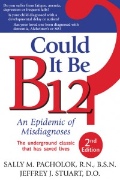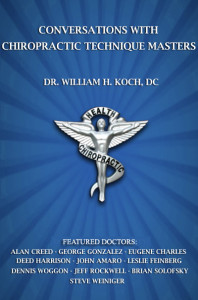Interview with Sally Pacholok RN
 Could it be B12? An Epidemic of Misdiagnosis, by Sally Pacholok, and Jeffrey J. Stuart is one of the most im-portant books I have read in a long time. It is one that should be read by every doctor and health care professional regardless of specialty. It will change and save lives as the information it contains dictates new standards of care.
Could it be B12? An Epidemic of Misdiagnosis, by Sally Pacholok, and Jeffrey J. Stuart is one of the most im-portant books I have read in a long time. It is one that should be read by every doctor and health care professional regardless of specialty. It will change and save lives as the information it contains dictates new standards of care.
Sally Pacholok, R.N., and Jeffrey Stuart, D.O., have done an incredible job of assembling a wealth of information and have provided extensive scientific documentation to back up every assertion that they make.
As I read this book, I found it incredible and quite disturbing that most of this information has been available, but largely ignored for many decades.
This book left me with a hollow feeling in my gut, wondering how many patients I have seen over the years that had an undiagnosed B12 deficiency that I had missed. I have vowed not to miss another. Beyond that, I have pledged my support in helping Sally Pacholok and Dr. Stuart to raise awareness of what they correctly term an “epidemic of misdiagnosis.”
KOCH (K) : Sally, I was not exaggerating when I said that this is one of the most important books I have read in decades. The effects of vitamin B12 deficiency have been badly underplayed and ignored in favor of more exotic, and more expensive-to-treat, diagnoses.
PACHOLOK (P): You are right, Bill. It is very frustrating when intelligent, well-educated doctors choose to turn a blind eye, as if such an easily diagnosed and inexpensively treated condition were beneath them.
K: It is hard for me to wrap my head around that kind of attitude. My take on it is that it makes it easy for any of us to be a hero for getting it right. The short- and long-term ramifications are enormous.
P: As you know, my husband and I work in the emergency room of a busy hospital. Amazingly, diagnosing B12 deficiency is not considered to be appropriate for ER doctors and nurses. Yet how can you not, when we see the same patients appear over and over again with injuries from one fall after another simply because of weakness, balance problems, leg and back pains or glove and stocking numbness of hands and feet. Many walk with a slow, foot-slapping gait because they can’t tell when the bottoms of their feet are touching the floor. In addition, B12 deficiency can cause visual disturbances, dizziness,
vertigo or postural hypotension. These problems dramatically increase the risk of falls, and falls in turn can lead to broken bones, hospital stays and often an end to an independent life for many seniors.
K: What I find equally amazing is the mental and emotional manifestations of B12 deficiency. You cite so many cases of elderly people who have been diagnosed with Alzheimer’s dis-ease or senile dementia yet have regained their mental faculties after the deficiency was recognized and treated.
Likewise, there are many people of all ages suffering from severe anxiety, depression and a host of other neuro-emotional disorders, who become hooked on dangerous psychotropic drugs when the underlying problem is vitamin B12 deficiency.
P: Yes. I believe that untreated patients who are suffering from an undiagnosed deficiency of B12 will eventually develop dis-orders of the nervous system.
K: Sally, all of the information and the cases you present in your book are absolutely relevant to the day-to-day practice of chiropractic. That is why I felt the urgency to call my colleagues’ attention to it.
Every chiropractor needs to be aware of the far-reaching neurological effect of B12 deficiency and how it can masquerade as multiple sclerosis, Parkinson’s and other dreaded neurological disorders.
P: It’s frightening to think of how many people are suffering and dying because this simple diagnosis is never even considered.
K: One of the most important points you make in your book is the urgent need for revision of what should be considered normal serum B12 levels. When serum B12 is tested, the labs and doctors us a “range of normal” scale which current data shows to be obsolete.
Please tell our readers what the currently accepted serum B range is, and how it needs to be revised to correctly reflect level appropriate for optimal health.
P: : That is where the reform must first take place. Laboratories and doctors must be made aware that the serum values of vitamin B that have been thought to be normal or acceptable are, in fact, marginal or woefully inadequate for optimal health.
The current guidelines for serum vitamin B12 suggest 271-870 pg/ml as the normal range and less than 200 pg/ml as deficient. We advocate treatment in all symptomatic patients with serum B12 below 450 pg/ml. At this time, we believe normal serum B12 levels should be greater than 550 pg/ml. For brain and nervous system health and prevention of disease in older adults, serum B12 should be maintained near or above 1,000 pg/ml.
K: Sally, you and Dr. Stuart have done a masterful job of covering all aspects of the subject of B12 deficiency. You have made it so easy to access the information you present through the many appendices you provide. You have referenced all of your information and backed up every statement you make so clearly that anyone can feel secure in quoting you.
Congratulations on providing an important work that will undoubtedly serve millions of people.

